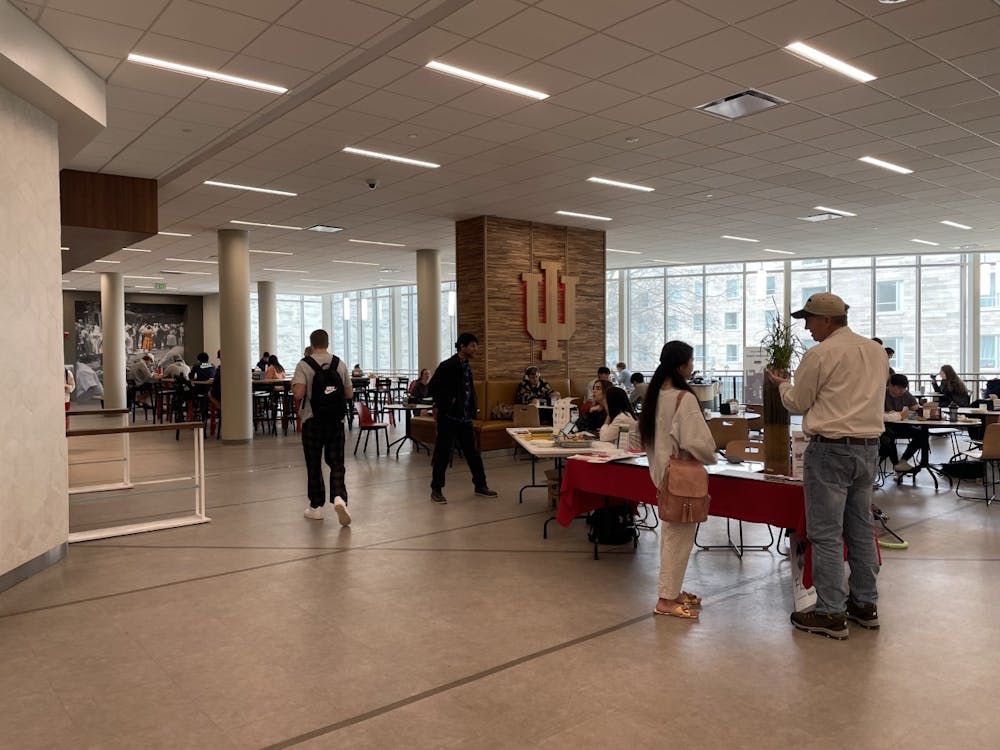Fischer Farms is collaborating with Sustain IU to teach students about where their food comes from in all-you-care-to-eat dining halls.
Fischer Farms, a 750-acre family-run farm located in St. Anthony, IN, primarily produces natural beef.
Rahul Shrivastav, executive director of IU Dining said in an email that Fischer Farms is IU Dining’s most significant supplier.
He said all IU Dining’s ground beef and steaks are sourced from their farm.
IU also buys products from suppliers including Gunthrop Farms, Heartland Family Farm and Smoking Goose Meatery. All of these suppliers are located in Indiana.
[Related: 'It defeats the whole purpose of recycling': city sanitation asks community to check habits]
Joseph Fischer, sales manager at Fischer Farms, said the farm practices regenerative agriculture. He said the farm does this through carbon capture, reducing emissions, cleaning and conserving water and developing healthy soil ecosystems.
Regenerative agriculture helps fight climate change by improving the health of the soil. This can be done by increasing the amount of organic matter in the soil and restoring the diversity of life in the soil which helps draw down carbon.
He said it is important to teach students about where their food comes from.
“There’s a lot of unknowns about where food comes from,” Fischer said. “When people drive by farms and drive by fields, they automatically assume that food is going to a plate near them when in reality the average processed food travels 1,300 miles before it hits a plate.”
Fischer said IU Dining is interested in cutting down its Scope 3 emissions. Scope 3 emissions include emissions from an organization’s business activities but outside of the organization’s direct control or ownership. He said IU Dining is looking at the climate impact of the products it purchased before the products get to campus. He said one way they’re doing this is by purchasing sustainably raised meat from Fischer Farms.
“IU gets it,” Fischer said. “They understand the importance of sustainable purchasing and they understand the impact that they’re making.”
[Related: Despite compost signs, IU hasn't composted since the COVID-19 pandemic]
According to the Real Food Challenge organization, the four characteristics of “REAL Food” include ecologically sound, humane, fair trade and local. If an item does not fall under any disqualifying categories, including labor or human rights violations, GMOs, CAFOs or artificial dyes, the item is deemed as “REAL” based on meeting at least one of the “REAL Food” characteristics.
According to the IU Food Institute, in the fiscal year 2017, IU purchases of “REAL Food” made up 5.59% of expenditures. In the fiscal year 2022, purchases of “REAL Food” rose to 10% of expenditures.
Isabella DeMarco, IU senior and sustainable food intern at Sustain IU, communicates directly with students at tabling events inside IU dining halls.
She said Fischer Farms is environmentally conscious with their beef production. Beef production is commonly criticized for warming the climate, wasting land and polluting and wasting water.
She said the owner of Fischer Farms, Dave Fischer, was able to join her for a tabling event in McNutt Dining Hall on April 6.
DeMarco said he brought a ryegrass display to the tabling event to use as a talking point. Ryegrass is important in Fischer Farms’ regenerative agriculture because it keeps soil covered and has a fast growth rate that captures carbon. It adds organic matter to soil and is also a food source for livestock.
[Related: Rises in "all-you-care-to-eat" food waste puts strains on IU Dining workers]
In addition to discussing Fischer Farms’ practices, she said she also talks about sustainable food on campus and getting involved through organizations like IUSG which has representatives on the Student Sustainability Council. IUSG currently has two sustainability initiatives. One centers around being carbon neutral by 2040 and the other aims to incorporate the Real Food Challenge in dining halls, according to its student initiatives.
“We’re really trying to get people to think about where their food comes from,” DeMarco said.
She said it is important for students to learn about sustainability as climate change and the environmental crisis will continue to be an issue.
“It’s not an option to ignore our changing climate anymore,” DeMarco said. “It’s going to affect every sector, every industry, and every person. You will be affected by climate change and the environmental crisis.”




